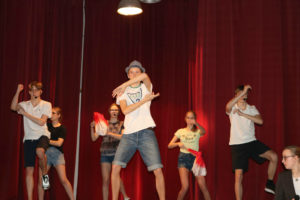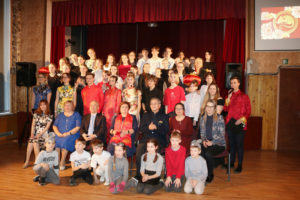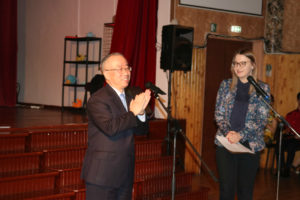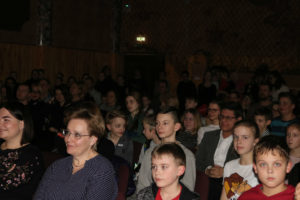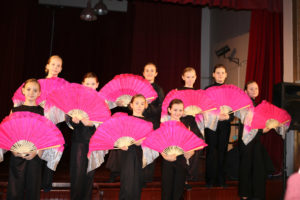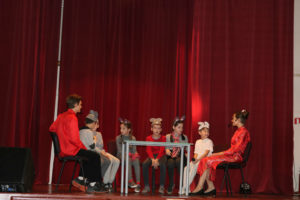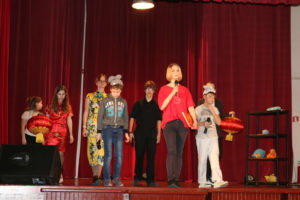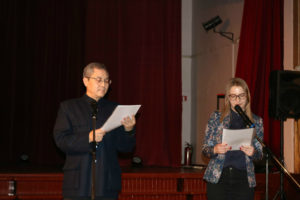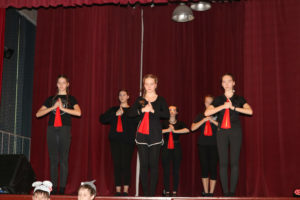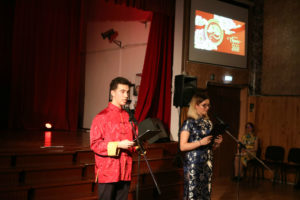2020 Riga Daugavgriva Secondary School Welcomes Golden Rats
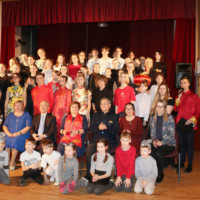
拉脱维亚当地时间1月27日下午两点半,里加道加瓦河口中学庆祝2020年中国春节表演在校礼堂隆重举行。
中国驻拉脱维亚大使馆大使梁建全先生,拉脱维亚大学孔子学院中方院长尚劝余教授及夫人张桂英女士,拉脱维亚大学孔子学院秘书白丽娜(Barisa Katrina)女士及汉语教师志愿者出席了本次表演活动。
活动在学校合唱团学生所演唱的拉脱维亚歌曲《Kūko, kūko dzeguzīte》中拉开序幕。里加道加瓦河口中学校长olga seļutina女士致欢迎辞,向嘉宾们介绍了学校,并对拉脱维亚大学孔子学院向我校提供汉语教学致以诚挚的感谢。拉脱维亚歌曲《Baltā dziesma》之后,中国驻拉脱维亚大使馆大使梁建全先生发表讲话,首先介绍了中国的十二生肖,并展开了中国鼠年的意义,在谈到拉脱维亚的“汉语热”时,希望两国人民的友谊能在愈加密切的文化交流中不断加深,更加紧密。接下来,拉脱维亚大学孔子学院中方院长尚劝余教授发表讲话,对学校文化活动开展成果给予了高度肯定,感谢学校师生为此所做的努力,并祝愿拉脱维亚本土教师莲娜(Jeļena Židkova)顺利申请到中国政府奖学金,赴华南师范大学攻读汉语国际教育硕士学位,学成归国后成为能够独当一面的汉语教师。
在集体舞蹈《Espiranza》之后,情景故事《话说中国年》正式拉开序幕。《话说中国年》由汉语课的三年级到十二年级的学生们一起表演完成。讲述了新年前夕两只孤儿小老鼠在不断学习汉语的过程中,在新年前夕“抵抗”邪恶的“夕兽”的故事。在故事中,穿插了学生们精心准备的歌舞表演《bopomofo》、《茉莉花》、《数字歌》,同时还展示了中国太极,赢得满堂彩。最后,活动在参演学生《美好新年》大合唱的融洽氛围中落下帷幕。期间还贯穿了春节知识有奖竞答环节,学生争相举手,热闹非凡,表明了大家对中国春节的了解之多,喜爱之深。
本次活动获得了中国驻拉脱维亚大使馆大使梁建全先生,拉脱维亚大学孔子学院中方院长尚劝余教授及校领导的高度评价,赢得了校师生及家长的喜爱。参加表演的学生表示虽然排练很辛苦,但这样练习汉语很有意思。本次活动不仅帮助学生获得了汉语学习的乐趣及成就感,了解了生肖、春节文化知识,感受了中国传统文学深厚意蕴,体味了歌舞声乐悠远魅力。并且吸引了更多人走近汉语,走近中华文化,走近中国。
At 2:30 p.m. local time on January 27, Riga Daugavgriva Secondary School celebrated the 2020 Chinese Spring Festival performance in the school auditorium.
Mr. Liang Jianquan, Ambassador of the Chinese Embassy in Latvia, Prof. Shang Quanyu, Director of the Confucius Institute at the University of Latvia, and Mrs. Zhang Guiying, Ms. Barisa Katrina, Secretary of the Confucius Institute at the University of Latvia, and volunteer Chinese teacher attended the performance.
The event kicked off with the Latvian song “Kūko, kūko dzeguzīte” sung by the students of the school choir. Mrs. Olga Seļutina, the principal of Riga Daugavgriva Secondary School, gave a welcome speech, introduced the school to the guests, and expressed her sincere thanks to the Confucius Institute at the University of Latvia for providing Chinese class to our school. After the Latvian song “Baltā dziesma”, Mr. Liang Jianquan, Ambassador of the Chinese Embassy in Latvia, gave a speech, first introduced the Chinese zodiac signs, and started the meaning of the Chinese Year of the Rat. The friendship between the people of China can be deepened and strengthened in the ever-increasing cultural exchanges. Next, Prof. Shang Quanyu, Director of the Confucius Institute at the University of Latvia, gave a speech, highly praised the achievements of the school’s cultural activities, thanked the teachers and students for their efforts, and wished Latvian teacher Jeļena Židkova successfully applied for a Chinese government scholarship and went to South China Normal University to study for a master’s degree. After returning to Latvia, she will become a Chinese teacher who can stand alone.
After the collective dance “Espiranza”, the situational story “Talking Chinese Year” officially kicked off. “Talking Chinese Year” was performed by students from the third to twelfth grade of the Chinese class. It tells the story of two orphaned little mice on New Year’s Eve “continuing” the evil “Xi Beast” on the New Year’s Eve in the process of continuously learning Chinese. In the story, the students’ carefully prepared song and dance performances “BoPoMoFo”, “Jasmine”, and “Digital Song” were interspersed. At the same time, Chinese Tai Chi was also displayed, winning a lot of applause. Finally, the event came to a close in a harmonious atmosphere of the student’s “Good New Year” chorus. During the Spring Festival, there were prize-winning and knowledge-quizzing sessions in the Spring Festival. Students rushed to raise their hands and were very lively, indicating that everyone knew and loved the Chinese Spring Festival.
The event was highly praised by Mr. Liang Jianquan, Ambassador of the Chinese Embassy in Latvia, Prof. Shang Quanyu, Director of the Confucius Institute at the University of Latvia, and the leaders of the school. The students who participated in the performance stated that although the rehearsal was very hard, it was very interesting to practice Chinese in this way. This activity not only helped students acquire the fun and sense of achievement in Chinese language learning, but also learned the cultural knowledge of the Chinese zodiac and the Spring Festival. They also felt the profound meaning of traditional Chinese literature and experienced the long-term charm of singing and dancing. It also attracted more people to approach Chinese, approach Chinese culture, and approach China.

